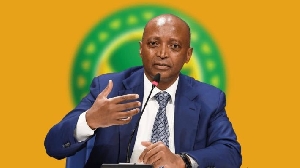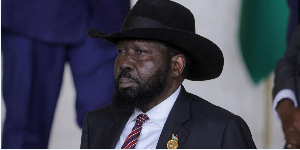The Centre for Democratic Development (CDD) mid-term assessment of the Kufuor administration on Tuesday described the general weakness of Ghana?s Parliament vis-?-vis the Executive as one of the major governance deficits in the country.
?Although the Constitution gives Parliament (through its committees) an important oversight role in the administration of the state, a political culture characterised by a hegemonic executive has kept Parliament weak and ineffective in its check on the executive,? the CDD findings said.
The report, which was read by H. Kwasi Prempeh, Director for Legal Policy and Governance, CDD-Ghana, (and registered member of Ghanaweb's discussion forum SIL) at a forum held at the centre?s conference room in Accra, further described the inability of the Kufuor administration to reverse this longstanding image of Parliament as one of the minus sides of the NPP administration.
Significantly, Prempeh said, the President?s selection of too many ministers of state, including nearly all-key ministers from Parliament and his continuation of the practice of appointing non-minister MPs to serve on public boards have effectively neutralised the potential of Parliament to serve as an important oversight institution.
The rubber stamping of the famous $1bn IFC loan document both through the Finance Committee of Parliament and in the full House, with no credible independent due diligence by Parliament, Prempeh went on, is a classic case of a Parliament that is excessively deferential to the desires and wishes of the executive.
The overall context within which this assessment was undertaken and the point of departure for the discussion was according to Prof E. Gyimah-Boadi, executive director, CDD-Ghana cumulative and steady, adding that there has been significant improvement in governance in Ghana under the Fourth Republic and under the Kufuor-NPP administration in particular.
However, he emphasised, ?this assessment is not an exercise in relativity.? ?We do not seek to and are not interested in comparing governance under Kufuor-NPP with governance under Rawlings-NDC,? Prof Gyimah-Boadi said. ?Nor are we assessing governance under Kufuor-NPP administration in terms of ?tropicalised? or some exotic African variety of governance.?
The standards of governance being applied here are absolute rather than relative, and global rather than developing nation,? Prof Gyimah-Boadi pointed out.
Meanwhile, the report went on to describe the Kufuor administration as ?minimalist? when it comes to upholding constitutional principles and values. Prempeh said while the Kufuor government has generally respected the constitution, it has not tired to do more than minimally required under the law. Nor has it restrained itself from exploiting for its political benefit the full measure of existing loopholes and opportunities in the Constitution.
?Taking advantage of an absence of a constitutional or statutory ceiling in the size of the Supreme Court,? the CDD said, ?the Kufuor administration has appointed a large Supreme Court. While the quality of the appointments has been generally high, it has created the perception of court packing.?
However, the CDD on the plus side of the Kufuor government, said President Kufuor scores high personal marks for refraining from acts, omissions or utterances that would undermine respect for law and the Constitution.
Prempeh further recognised the separation of party and state, the dissolution of the ?culture of silence as well as enforcement of laws against official malfeasance as some of the positive achievements of the Kufuor government.
In all, the CDD concluded by saying, ?because this was a qualitative, rather than a quantitative assessment, no attempt has been made here to assign numerical value or weights to the points mentioned.? It said the fact that there may be numerically more points highlighted on the ?minus side? of the balance sheet than on the ?plus side?, does not suggest or imply a negative net verdict against the Kufuor-NPP.
CDD ask government to take bold initiatives
GNA -- The Centre for Democratic Development (CDD) on Tuesday said the Kufuor government has attained positive results within its two years of administration but it needed to take more bold initiatives to rescue the economy to ensure better governorship.Speaking at a forum on "The Kufuor And New Patriotic Party (NPP) Administration: Mid-Term Governance Assessment," in Accra on Tuesday, four prominent political analysts said the plus and the minuses of the government should be seen in the context of myriad of problems confronting the nation.
They said government could employ effective tax collection systems and to increase fuel prices within the existing economic climate to ensure that adequate taxes were raised for development.
Professor Emmanuel Gyimah-Boadi, Executive Director, CDD and Mr Kwasi Prempeh , Director, Legal and Policy Governance, CDD supported these views.
The two gave a summary of the economic management and economic governance after speaking on different topics on "The Kufuor And New Patriotic Party (NPP) Administration: Mid-Term Governance Assessment" at forum the CDD organised in Accra.
Mr Prempeh speaking on the rule of law and constitutionalism and human rights said the Kufuor administration has generally respected the Constitution and it did not try to do more than what was minimally required under the law.
He said the government exploited the benefit of the loopholes and opportunities in the constitution.
Mr Prempeh cited that government appointed a large number of new justices to the Supreme Court and created the perception of court parking.
"Again taking advantage of the constitutional ceiling on the number of Ministers, the Kufuor administration has used the presidential power of patronage to appoint far too many Members of Parliament as Ministers."
He said although the Kufuor administration has generally respected the independence of the Commission on Human Rights and Administrative Justice and the Judiciary "It has shown no exceptional passion or interest to provide them with the level of resources necessary to make them into credible agencies for the delivery of justice in Ghana.
Mr Prempeh said despite the setting up of a Ministry for Women and Children's Affairs government can do more by initiating a legislating to ensure that the property rights of spouses were enhanced.
He said the government's rhetoric on indiscipline was not being backed by credible programme of action and sanctions hence the programme was not moving "beyond sermonising speeches and moral suasion."
Professor Gyimah-Boadi speaking on "Accountability And Anti-Corruption" said the government started very well and should not lose momentum.
He said the government has so far demonstrated through the prosecution of some people at the Fast-Track High Court that it was living to its policy of zero tolerance for corruption.
Prof Gyimah-Boadi said it was necessary to provide adequate budgetary allocation to the Serious Fraud Office and to ensure that external auditors also audited the Audit Service.
He said the successful holding of parliamentary bye-elections and the district level elections have shown that the government was committed to upholding democratic practices but that the government should stick to its electoral promises of making district assembly elections partisan.
Dr Baffour Agyeman-Duah, Associate Executive Director, CDD speaking on the security sector and the Ghana foreign policy noted that the "overall governance in the security sector under the Kufuor administration has been progressive.
"We observed that concrete steps were taken to improve civil-military relations, to enhance the professionalism of the Ghana Armed Forces, to strengthen the capacity of the Ghana Police Service, and to improve the personal security of citizens."
He said the government has used "the good governance credibility of Ghana to enhance the country's role in international relations and has even taken some unprecedented approaches to African politics."
Dr Audrey Gadzekpo, Lecturer, School of Communications Studies of University of Ghana and CDD Board Member said the government relationship with the press has been very good.
Through the repeal of the Criminal Libel Law and the President's interactions with the press and the inclusion of the private press in the Castle Press Corps gave the government the positive relations it has with the media.
She said the government has so far not make any overt attempt to interfere with the state media in its editorial policies.
Dr Gadzekpo said the government would do the country more good in its relations with the press and to improve freedom of speech, make bold attempt to ensure the passing into law of the Freedom of Information Bill and to repeal some laws like Contempt of Parliament and the Contempt of the Court from the statutes.












